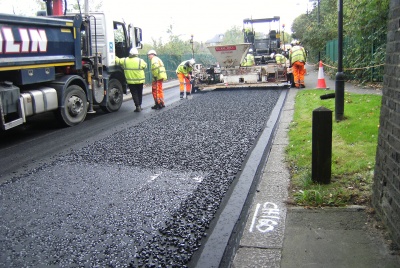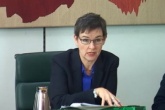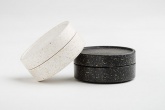Recycled plastic road surface trialled by Enfield Council
Enfield Council is on the road to greener infrastructure with the news that it has begun road resurfacing using asphalt made from recycled plastics.

Produced by Lockerbie-based company MacRebur, the asphalt contains a mix of pelletised waste plastics; between three and 10 kilogrammes (kg) of 100 per cent recycled plastics are used in every tonne of road mixture, added as a binding agent in place of fossil fuel bitumen, which usually makes up around 10 per cent of the mix.
The London council initially trialled the pioneering new road surface on Green Dragon Lane, a relatively busy thoroughfare with three bus routes.
Cllr Daniel Anderson, Enfield’s Cabinet Member for Environment, said: “We all know that plastics can have a devastating impact on the environment, particularly when the product reaches our seas and oceans. We all have a responsibility to step up our efforts to help the environment by recycling more, upcycling and responsibly sourcing materials.”
“Enfield Council is delighted with this road trial and hope we can use more of the product across the borough to help divert plastics from landfill and reduce the carbon footprint for road construction.”
MacRebur claims the product not only provides an environmentally-friendly alternative to traditional asphalt (both by providing a use for waste plastic otherwise destined for landfill, and by reducing bitumen leach into rivers and streams) but is also stronger and longer-lasting. CEO Toby McCartney cites the potholes on his home street as triggering the business idea back in 2016, and took inspiration from seeing waste pickers in Southern India sealing potholes with melted plastic.
The company gained over £1 million in investment through crowdfunding site Seedrs in February this year, and in June 2016 won Richard Branson’s Virgin Voom competition for start-ups, securing £50,000 in funding, mentoring and a £250,000 marketing campaign with advertising at London Waterloo Station. The competition had a strong sustainability focus, as MacRebur shared the prize with bio-bean, a company that turns waste coffee grounds into advanced biofuels now powering some of London’s buses.
Read our interview with bio-bean’s founder Arthur Kay from Issue 84 of Resource magazine

Cumbria was the first council in the UK to trial the product, with a £200,000 resurfacing scheme for the A7 in the Lake District using recycled plastic pellets equivalent to 500,000 plastic bottles. MacRebur has also surfaced a runway at Carlisle City Airport, and has trials pending with Fife and Cambridgeshire councils.
For Enfield, the success of the initial trial has led to the council securing funding from Transport for London in order to resurface more roads across the borough.
Other attempts to improve the environmental credentials of roads include solar road surfaces - one such road is being tested in the village of Tourourvre-au-Perche, Normandy, which cost €5 million (£4.2 million) to build in 2016. However, MacRebur is the first company to use waste plastics in roads.
Dr Karl Williams, director of the University of Central Lancashire’s Centre for Waste and Resource Management, told Sky News that it remains unclear how environmentally friendly the roads really are: “They are only going on trial roads at the moment, and in terms of what plastics they are using, where the plastic comes from and the level of contamination, there are lots of issues that are still big question marks.”









